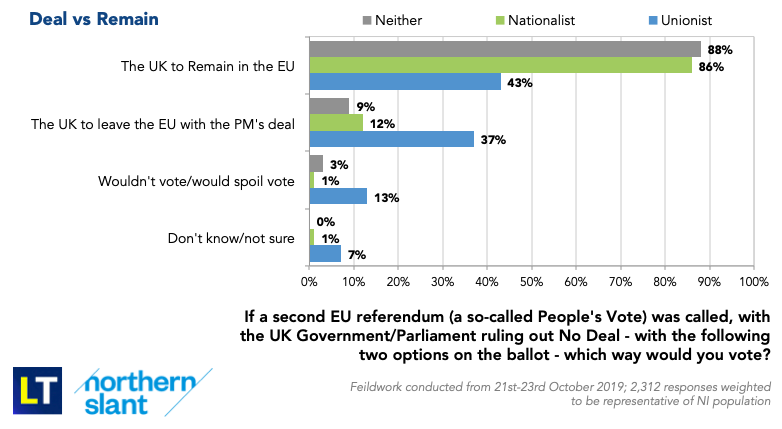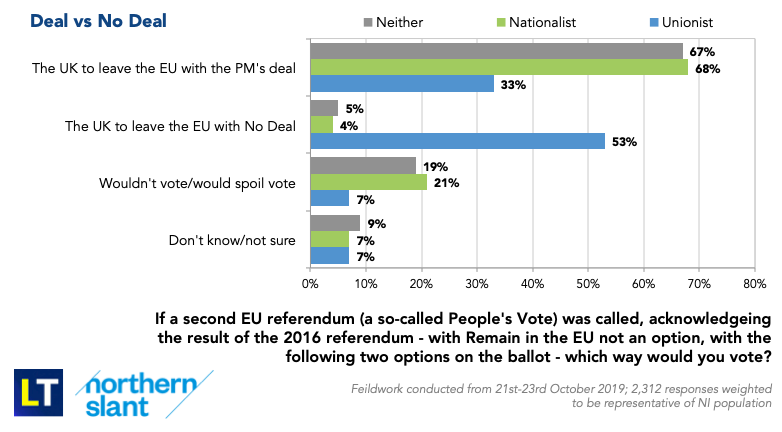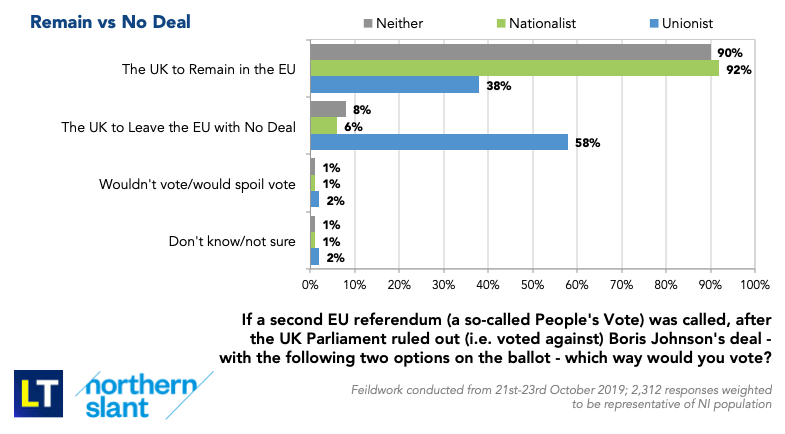In the House of Commons on Monday the DUP’s Sammy Wilson MP said that “the electorate, the unionist electorate, in Northern Ireland” are “so angry…so despairing…so bewildered” by the Prime Minister’s broken promises that “they would return 100 DUP MPs” if given the option.
It was a bold claim and a crucial parenthesis.
Implying that anger, desperation and bewilderment are the drivers of your electoral support is a curious political strategy but, leaving this aside, it was the Rt Hon Mr Wilson’s hasty qualification of “the electorate” to “the unionist electorate” that was arguably most significant.
According to a LucidTalk poll released this week, on the political issue of our time – Brexit – the unionist electorate in Northern Ireland are in the minority, and DUP voters have a further minority preference.
When asked to choose between different Brexit scenarios 63% of respondents said they would vote for the UK to remain in the EU over leaving on the terms of the Prime Minister’s deal (supported by 25%) or leaving with no deal (supported by 34%).
If offered a choice between the ‘Boris Deal’ or no deal, 49% of those polled say they would prefer the former, with 30% opting for no deal. Overall the poll suggests a hierarchy of preferences in the Northern Irish electorate whereby there is substantial majority support for Remain, a reluctant preference for Boris Johnson’s deal, and a minority who support no deal regardless.
This preference hierarchy was reflected, to greater and lesser degree, among Sinn Féin supporters, nationalist voters and those who identify as neither unionist nor nationalist. 86% of nationalist and 88% of ‘neither’ voters would choose Remain over the Prime Minister’s deal; a higher percentage would choose Remain over no deal – 92% of nationalist and 90% of ‘neither’ voters respectively.
And when asked to choose between leaving with the current deal or leaving without a deal, 68% of nationalist and 67% of ‘neither’ voters would opt for the former with only 4% of nationalists and 5% of ‘neither’ voters willing to support no deal.
Among unionists the picture is very different.
As a whole, unionist respondents showed greater support for no deal over Remain (58% vs. 38%); No Deal over the ‘Boris Deal’ (53% vs. 33%); and Remain over the ‘Boris Deal’ (43% vs. 37%). Taken together, this suggests a unionist hierarchy of preferences for No Deal followed by Remain, with the Prime Minister’s deal bringing up the rear.
Yet, breaking the results down further, DUP supporters emerge as a further minority, with the party’s voters showing the highest level of support for No Deal over Remain (75% to 22%), a similar level of support for No Deal over the Prime Minister’s deal’ (71% vs. 23%) and, diverging from their fellow unionists, DUP voters would opt for the Prime Minister’s deal’ over Remain (42% vs. 29%).
The significance of the 29% of DUP voters who would choose Remain over Boris Johnson’s deal ought not to be overlooked, but still, the hierarchy of preferences among the party’s supporters appears to be for No Deal, followed by the deal on the table, with Remain receiving the lowest level of support.
Based on the results of this week’s poll, the political landscape of Northern Ireland appears to be changing.
Like our counterparts across that (in)famous Irish Sea, the issues raised by Brexit have fundamentally destabilised politics in Northern Ireland, not least contributing to the unenviable, record-breaking lack of government. Unlike elsewhere in the UK, we have not been able to accurately track the impact of Brexit on traditional party politics because the corridors of Stormont have been so empty.
In this context, the results of the coming general election will be illuminating.
For, emerging from the maelstroms of Brexit there seems to be a new political typography in Northern Ireland. One realigned on the axis of Brexit, in which gaps between variations of unionism are more apparent, roughly half the electorate identify as neither nationalist nor unionist and, crucially, “the unionist electorate” no longer represent the majority.
If these trends continue, they will be transformative.
Methodology, and more on LucidTalk
Polling was carried out by Belfast based polling and market research company LucidTalk. The project was carried out online from 2pm 21st October 2019 to 10pm 23rd October 2019. The project targeted the established Northern Ireland (NI) LucidTalk online Opinion Panel (12,944 members) which is balanced by gender, age-group, area of residence, socio-economic group, and community background, in order to be demographically representative of Northern Ireland.
2,386 full responses were received, and a data auditing process was carried out to ensure all completed poll-surveys were genuine ‘one-person, one-vote’ responses, and also to collate a robust and accurate balanced NI representative sample. This resulted in 2,312 responses being considered in terms of the final results – the results presented. Data was weighted to the profile of all NI adults aged 18+. Data was weighted by age, gender, socio-economic group, previous voting patterns (i.e. election turnout estimation), socio-economic group, constituency, constitutional position, party support, and community i.e. religious affiliation. All data results produced are accurate to a margin of error of +/-2.6%, at 95% confidence.



